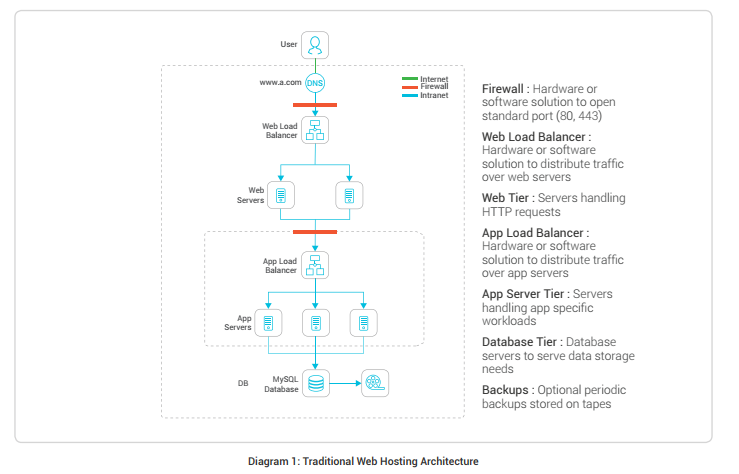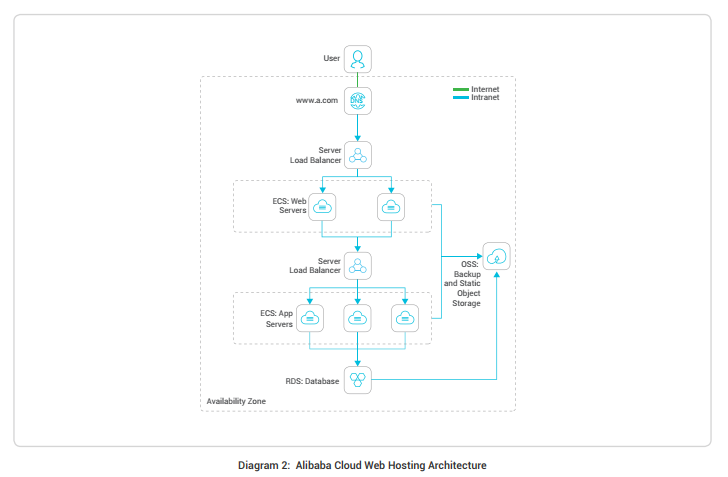This article was originally published on Alibaba Cloud. Thank you for supporting the partners who make SitePoint possible.
Deploying a highly available and scalable web application on a traditional data center is a complex and expensive undertaking. One must invest a lot of effort and resources into capacity management. But more often than not, it ends up in over or under-provisioning of resources, further resulting in inefficient investment in underutilized hardware. To tackle this challenge, Alibaba Cloud offers a reliable, scalable, and high-performing cloud infrastructure for most demanding web application deployment scenarios. This document intends to provide practical solutions and best practices when it comes to scaling your web application on Alibaba Cloud.
Traditional Solution for Common Web Application Hosting
In a traditional web hosting space, designing a scalable architecture is always a challenge. The below diagram depicts a traditional web hosting model. The purpose of this diagram is to help you compare it with a similar architecture hosted on the cloud.

Traditional web hosting usually follows a three-tier design that divides the architecture into presentation, application, and persistence layers. The design achieves scalability through the inclusion of additional servers at each of these layers. The architecture also has built-in high availability features. The section below examines the means of deploying this traditional web hosting in Alibaba Cloud.
Simple Web Application Hosting Architecture on Alibaba Cloud
The diagram below shows how the traditional web hosting architecture looks like when deployed using various Alibaba Cloud products and services:

The key components of this architecture include:
- Elastic Compute Service (ECS) — Built on Alibaba Cloud's own large-scale distributed computing system, Elastic Compute Service or ECS is a scalable and highly-efficient cloud computing service. Alibaba Cloud ECS helps you to quickly build more stable and secure web applications to adapt to your business' real-time needs.
- Object Storage Service (OSS) — Alibaba Cloud offers various options to store, access, and backup your data on the cloud. For static storage, it provides Object Storage Service (OSS) to facilitate automatic data replication and failure recovery.
- ApsaraDB for RDS — Relational Database Service or RDS is a stable, reliable, elastic and high-performance online database service based on Alibaba Cloud's own distributed system. It supports MySQL, SQL Server, PostgreSQL, and PPAS. Furthermore, it provides a comprehensive set of features including disaster recovery, data backup, monitoring, and migration.
- DNS — Alibaba Cloud DNS service provides a highly available and scalable DNS service for your domain management needs. It automatically reroutes requests for your domain to the nearest DNS server.
- Server Load Balancer (SLB) — Server Load Balancer is a web traffic distribution service that maximizes and extends the external service capabilities of your web applications. By seamlessly distributing traffic across multiple cloud servers and eliminating single points of failure, SLB enhances the reliability, usability, and availability of your applications.
Leveraging the Cloud for Web Application Hosting
When deploying a web application on Alibaba Cloud, you should consider making modifications in your deployment to fully utilize the advantages of the cloud. Below are some key considerations of when hosting an application on Alibaba Cloud.
Multiple Data Centers in a Region
Within a certain region, Alibaba Cloud usually operates at least two data centers called Availability Zones (AZs). Elastic Compute Service (ECS) in different AZs are both logically and physically separated. Alibaba Cloud provides an easy-to-use model for deploying your applications across AZs for higher availability and reliability.
High Security for Web Applications and Servers
Web application security is one of the primary concerns for organizations today, with more than 90% of the applications being vulnerable to security attacks. These attacks can exploit websites and inherent servers, which puts businesses at the risk of financial loss. To protect your web applications from such attacks, Alibaba Cloud provides a suite of network and application security services, such as Anti-DDoS (Basic and Pro), Web Application Firewall (WAF), and Server Guard.
In addition to these services, users can proactively limit external traffic by defining firewalls and permissions. The diagram below depicts the Alibaba Cloud web application hosting architecture that comes with a group firewall to secure the entire infrastructure.
The post Best Practices of Web Application Hosting in Alibaba Cloud appeared first on SitePoint.
by Derek Wang via SitePoint
No comments:
Post a Comment